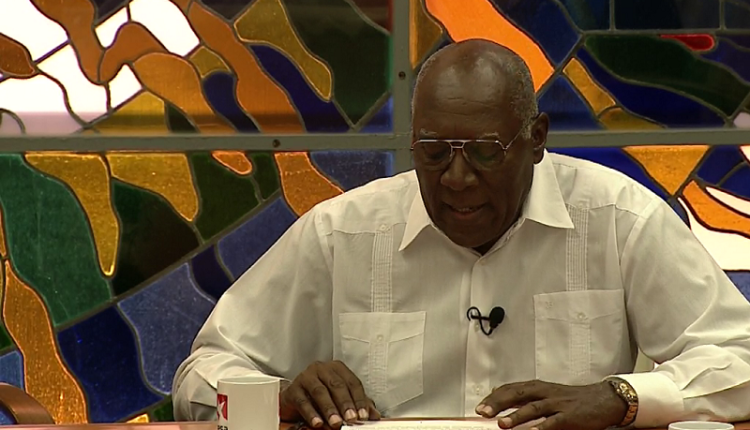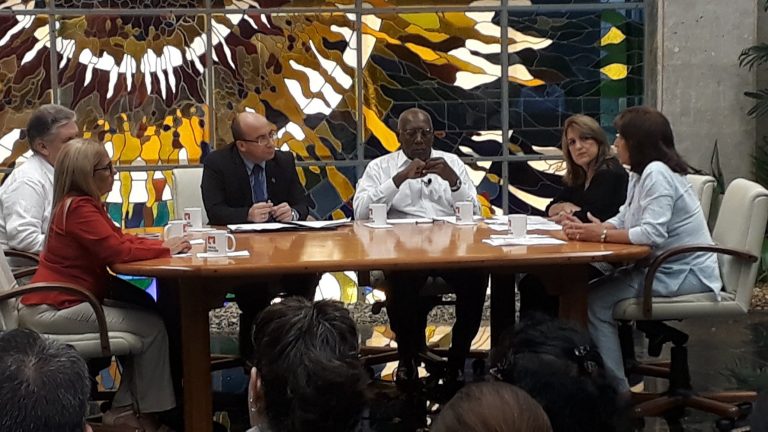 Vice President Salvador Valdés Mesa / Photo: President's Office
Vice President Salvador Valdés Mesa / Photo: President's Office
Cuba announces new economic measures
Cuban Vice President Salvador Valdés Mesa on Tuesday announced that the government will authorize the purchase of appliances, auto parts, and other merchandise in convertible currencies. The sale of these items will be available in more than 70 stores across the country.
The announcement came during the Mesa Redonda (Round Table) television program on Tuesday night attended by a number of ministers and government functionaries. As part of the new package of measures that attempts to deal with the country’s economic situation, it is now possible for Cuban citizens to import certain products through state-owned companies.
During the program it was stressed that there are no changes to customs regulations.
Valdés Mesa said that in recent years the importation by natural persons of merchandise without a commercial purpose has increased. Adding that “although the goods enter the country legally, after they are received they are often sold commercially.”
Analyzing this issue in order to better understand the causes and put order to it, a commission has been created that includes representatives from 14 agencies of the Central Government Administration. The vice president added that national experts on foreign and internal trade were consulted, as well as ministers and other experts in the field.
Valdés Mesa explained that assuring that the people received the basic food necessities, as well as personal hygiene and cleaning products, and given the country’s deficit of convertible currency (MLC), they had to reduce purchases of mid-range and high-end appliances, which led to, in some cases, the importation of these items by natural persons who travel abroad and return with them.
Another important factor for the current state, he warned, has been the intensification of the blockade against Cuba by the U.S. government, which “has limited remittances with the aim of harming the country, particularly Cuban families, and which also affects the non-state sector.” The Trump administration has intensified financial impediments to prevent Cuba’s transactions in its collections and payments abroad, Valdés Mesa stressed.
“All these factors have created a situation where the country does not have the necessary financing to import raw materials destined for industry and for our networks that supply the market,” he added.

The new measures
- Tariff exemptions will be granted for the importation of raw materials and supplies.(Priority will be given to materials meant for internal production of certain merchandise, and to the necessary products that are of greater demand among the population. These will be imported by the chain stores and other commercializing entities, which will reduce the cost of products to the population.)
- Import services will be provided to natural persons through import companies designated by the Ministry of Foreign Trade and Foreign Investment, and backed by convertible currency.
- Customs warehousing areas will be used that are currently in existence, in addition to others that may be created. They will be used for the sale of merchandise through designated importing companies. It will be another way to provide merchandise to the internal market.
- The consignment of goods by commission will be used to enhance their delivery through designated importing companies, which will be accessed by natural persons.
- Marketing services will be provided to individuals for auto parts and other multi-brand automotive products, through the state entity Servicios Automotores Sociedad Anónima (SASA), CIMEX companies and other entities that may be necessary.
The vice president stressed that the variants of electronic commerce, such as virtual stores, online sales and the use of national and international payment gateways, will be developed and promoted to the maximum. “All sales will be conducted through magnetic (credit) cards. Therefore, no cash sales will be made in the retail market.”
Valdés Mesa said that these new measures will improve the after-sales service (warranty) of household appliances sold in the national market, as well as repair and maintenance services. “The equipment that people import today do not have these benefits.”
During his announcement he explained that the commercialization of the items that are most imported will be carried out in more than 70 establishments in the existing network of stores throughout the territories.
According to Valdés Mesa, conditions for the opening of the planned areas in the network of stores have been created to begin sales in the last week of October. “It will be a gradual and orderly process that will benefit the population. In that sense, the economic and commercial entities have been prepared to provide these services,” he said.
“Prices will be competitive with those existing in retail markets of countries within our geographical area. They will not be fixed prices, but they will not be collection prices either,” he emphasized. Although the plan is to begin with a limited number of items, the supply of home appliances will gradually be expanded.
“The plan is to start sales of products that are in most demand — such as household appliances, electric mopeds, flat screen TVs, air conditioners, as well as auto parts. Meanwhile, sales in convertible pesos (CUCs) of the goods considered within the economic line will be maintained,” said the Cuban vice president.
(Translation to English by Progreso Weekly.)


